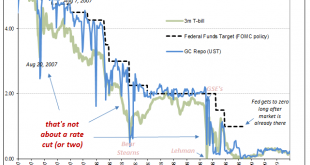Basic recession economics says that when you end up with too much of some commodity, too much inventory that you can’t otherwise sell, you have to cut the price in order to move it. Discounting is a feature of those times. What about a monetary panic? This might sound weird, but same thing. In other words, if you have too much cash (stay with me) and not enough takers, then the price you’ll accept to lend that cash must fall to accommodate the lack of demand. How...
Read More »Fed Balance Sheet Policy and Collateral
On his blog, Stephen Williamson discusses the Fed’s plan to maintain a much larger balance sheet in the future than before the crisis. He is not convinced that this plan is a good one. But what’s the harm in a large Fed balance sheet? The larger the balance sheet, the lower is the quantity of Treasury securities in financial markets, and the higher is reserves. Treasuries are highly liquid, widely-traded securities that play a key role in overnight repo markets. Reserves are highly liquid...
Read More »Fed Balance Sheet Policy and Collateral
On his blog, Stephen Williamson discusses the Fed’s plan to maintain a much larger balance sheet in the future than before the crisis. He is not convinced that this plan is a good one. But what’s the harm in a large Fed balance sheet? The larger the balance sheet, the lower is the quantity of Treasury securities in financial markets, and the higher is reserves. Treasuries are highly liquid, widely-traded securities that play a key role in overnight repo markets. Reserves are highly liquid...
Read More » Swiss Economicblogs.org
Swiss Economicblogs.org

